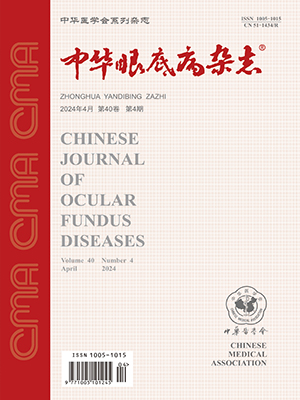| 1. |
闵晓雪, 牟佳, 刘依琳, 等. 抗血管内皮生长因子时代糖尿病视网膜病变的治疗演变[J]. 华西医学, 2017, 32(10): 1615-1619. DOI: 10.7507/1002-0179.201708076.Min XX, Mu J, Liu YL, et al. Evolution of the treatment of diabetic retinopathy in the age of vascular endothelial growth factor[J]. West Chin Med J, 2017, 32(10): 1615-1619. DOI: 10.7507/1002-0179.201708076.
|
| 2. |
Kim HS, Cho HJ, Yoo SG, et al. Intravitreal anti-vascular endothelial growth factor monotherapy for large submacular hemorrhage secondary to neovascular age-related macular degeneration[J]. Eye (Lond), 2015, 29(9): 1141-1151. DOI: 10.1038/eye.2015.131.
|
| 3. |
Farinha C, Martins A, Neves A, et al. Ranibizumab for the treatment of diabetic macular oedema in the real-world clinical setting in portugal: a multicentre study[J]. Ophthalmologica, 2019, 241(1): 1-8. DOI: 10.1159/000489046.
|
| 4. |
Jang JH, Kim KH, Lee SJ, et al. Photodynamic therapy combined with intravitreal bevacizumab in a patient with choroidal neovascularization secondary to choroidal osteoma[J]. Korean J Ophthalmol, 2012, 26(6): 478-480. DOI: 10.3341/kjo.2012.26.6.478.
|
| 5. |
Bennett N, John L, Likhar N, et al. Clinical efficacy and safety of current interventions for choroidal neovascularization associated with rare diseases: a systematic literature review[J]. Adv Ther, 2018, 35(5): 591-603. DOI: 10.1007/s12325-018-0698-9.
|
| 6. |
Al-Dhibi H, Hamade IH, Al-Halafi A, et al. The effects of intravitreal bevacizumab in infectious and noninfectious uveitic macular edema[J/OL]. J Ophthalmol, 2014, 2014: 729465[2014-07-21]. https://doi.org/10.1155/2014/729465. DOI: 10.1155/2014/729465.
|
| 7. |
Torry DS, Leavenworth J, Chang M, et al. Angiogenesis in implantation[J]. J Assist Reprod Genet, 2007, 24(7): 303-315. DOI: 10.1007/s10815-007-9152-7.
|
| 8. |
Kim M, Park HJ, Seol JW, et al. VEGF-A regulated by progesterone governs uterine angiogenesis and vascular remodelling during pregnancy[J]. EMBO Mol Med, 2013, 5(9): 1415-1430. DOI: 10.1002/emmm.201302618.
|
| 9. |
Vuorela P, Carpén O, Tulppala M, et al. VEGF, its receptors and the tie receptors in recurrent miscarriage[J]. Mol Hum Reprod, 2000, 6(3): 276-282. DOI: 10.1093/molehr/6.3.276.
|
| 10. |
Al-Khateeb GM, Mustafa FE, Sater MS, et al. Effect of the functional VEGFA-583C/T variant on vascular endothelial growth factor levels and the risk of recurrent spontaneous miscarriage[J]. Fertil Steril, 2011, 95(8): 2471-2473. DOI: 10.1016/j.fertnstert.2011.03.010.
|
| 11. |
Carmeliet P, Ferreira V, Breier G, et al. Abnormal blood vessel development and lethality in embryos lacking a single VEGF allele[J]. Nature, 1996, 380(6573): 435-439. DOI: 10.1038/380435a0.
|
| 12. |
Evans PW, Wheeler T, Anthony FW, et al. A longitudinal study of maternal serum vascular endothelial growth factor in early pregnancy[J]. Hum Reprod, 1998, 13(4): 1057-1062. DOI: 10.1093/humrep/13.4.1057.
|
| 13. |
Shiraishi S, Nakagawa K, Kinukawa N, et al. Immunohistochemical localization of vascular endothelial growth factor in the human placenta[J]. Placenta, 1996, 17(2-3): 111-121. DOI: 10.1016/s0143-4004(96)80004-x.
|
| 14. |
Goldman CK, Kendall RL, Cabrera G, et al. Paracrine expression of a native soluble vascular endothelial growth factor receptor inhibits tumor growth, metastasis, and mortality rate[J]. Proc Natl Acad Sci USA, 1998, 95(15): 8795-8800. DOI: 10.1073/pnas.95.15.8795.
|
| 15. |
Keskin U, Ulubay M, Dede M, et al. The relationship between the VEGF/sVEGFR-1 ratio and threatened abortion[J]. Arch Gynecol Obstet, 2015, 291(3): 557-561. DOI: 10.1007/s00404-014-3452-9.
|
| 16. |
Cross SN, Ratner E, Rutherford TJ, et al. Bevacizumab-mediated interference with VEGF signaling is sufficient to induce a preeclampsia-like syndrome in nonpregnant women[J]. Rev Obstet Gynecol, 2012, 5(1): 2-8.
|
| 17. |
Wang Y, Fei D, Vanderlaan M, et al. Biological activity of bevacizumab, a humanized anti-VEGF antibody in vitro[J]. Angiogenesis, 2004, 7(4): 335-345. DOI: 10.1007/s10456-004-8272-2.
|
| 18. |
Kubota T, Kiuchi Y, Sheridan C. Anti-vascular endothelial growth factor agents for ocular angiogenesis and vascular permeability[J/OL]. J Ophthalmol, 2012, 2012: 898207[2012-03-18]. https://doi.org/10.1155/2012/898207. DOI: 10.1155/2012/898207.
|
| 19. |
Wang F, Bai Y, Yu W, et al. Anti-angiogenic effect of KH902 on retinal neovascularization[J]. Graefe's Arch Clin Exp Ophthalmol, 2013, 251(9): 2131-2139. DOI: 10.1007/s00417-013-2392-6.
|
| 20. |
Csaky K, Do DV. Safety implications of vascular endothelial growth factor blockade for subjects receiving intravitreal anti-vascular endothelial growth factor therapies[J]. Am J Ophthalmol, 2009, 148(5): 647-656. DOI: 10.1016/j.ajo.2009.06.014.
|
| 21. |
Sawada O, Kawamura H, Kakinoki M, et al. Vascular endothelial growth factor in fellow eyes of eyes injected with intravitreal bevacizumab[J]. Graefe’s Arch Clin Exp Ophthalmol, 2008, 246(10): 1379-1381. DOI: 10.1007/s00417-008-0874-8.
|
| 22. |
Bakri SJ, Snyder MR, Reid JM, et al. Pharmacokinetics of intravitreal bevacizumab (Avastin)[J]. Ophthalmology, 2007, 114(5): 855-859. DOI: 10.1016/j.ophtha.2007.01.017.
|
| 23. |
Avery RL, Castellarin AA, Steinle NC, et al. Systemic pharmacokinetics following intravitreal injections of ranibizumab, bevacizumab or aflibercept in patients with neovascular AMD[J]. Br J Ophthalmol, 2014, 98(12): 1636-1641. DOI: 10.1136/bjophthalmol-2014-305252.
|
| 24. |
Gu X, Yu X, Dai H. Intravitreal injection of ranibizumab for treatment of age-related macular degeneration: effects on serum VEGF concentration[J]. Curr Eye Res, 2014, 39(5): 518-521. DOI: 10.3109/02713683.2013.848899.
|
| 25. |
Jin E, Bai Y, Luo L, et al. Serum levels of vascular endothelial growth factor before and after intravitreal injection of ranibizumab or conbercept for neovascular age-related macular age-related macular degeneration[J]. Retina, 2017, 37(5): 971-977. DOI: 10.1097/IAE.0000000000001274.
|
| 26. |
Zehetner C, Kirchmair R, Huber S, et al. Plasma levels of vascular endothelial growth factor before and after intravitreal injection of bevacizumab, ranibizumab and pegaptanib in patients with age-related macular degeneration, and in patients with diabetic macular oedema[J]. Br J Ophthalmol, 2013, 97(4): 454-459. DOI: 10.1136/bjophthalmol-2012-302451.
|
| 27. |
Pentsuk N, van der Laan JW. An interspecies comparison of placental antibody transfer: new insights into developmental toxicity testing of monoclonal antibodies[J]. Birth Defects Res B Dev Reprod Toxicol, 2009, 86(4): 328-344. DOI: 10.1002/bdrb.20201.
|
| 28. |
Briggs GG, Freeman RK, Yaffe SJ. Drugs in pregnancy and lactation: a reference guide to fetal and neonatal risk[M]. Philadelphia: Wolters Kluwer/Lippincott Williams & Wilkins Health, 2015.
|
| 29. |
Thorn M, Piche-Nicholas N, Stedman D, et al. Embryo-fetal transfer of bevacizumab (Avastin) in the rat over the course of gestation and the impact of neonatal Fc receptor (FcRn) binding[J]. Birth Defects Res B Dev Reprod Toxicol, 2012, 95(5): 363-375. DOI: 10.1002/bdrb.21026.
|
| 30. |
Sullivan L, Kelly SP, Glenn A, et al. Intravitreal bevacizumab injection in unrecognised early pregnancy[J]. Eye (Lond), 2014, 28(4): 492-494. DOI: 10.1038/eye.2013.311.
|
| 31. |
Introini U, Casalino G, Cardani A, et al. Intravitreal bevacizumab for a subfoveal myopic choroidal neovascularization in the first trimester of pregnancy[J]. J Ocul Pharmacol Ther, 2012, 28(5): 553-555. DOI: 10.1089/jop.2012.0067.
|
| 32. |
Jouve L, Akesbi J, Nordmann JP. Safety and efficacy of ranibizumab for pregnant women in idiopathic choroidal neovascularization[J]. Acta Ophthalmol, 2015, 93(7): 597-598. DOI: 10.1111/aos.12611.
|
| 33. |
Fossum P, Couret C, Briend B, et al. Safety of intravitreal injection of ranibizumab in early pregnancy: a series of three cases[J]. Eye (Lond), 2018, 32(4): 830-832. DOI: 10.1038/eye.2017.305.
|
| 34. |
Petrou P, Georgalas I, Giavaras G, et al. Early loss of pregnancy after intravitreal bevacizumab injection[J]. Acta Ophthalmol, 2010, 88(4): 136. DOI: 10.1111/j.1755-3768.2009.01572.x.
|
| 35. |
Kianersi F, Ghanbari H, Naderi Beni Z, et al. Intravitreal vascular endothelial growth factor (VEGF) inhibitor injection in unrecognised early pregnancy[J]. Invest New Drugs, 2016, 34(5): 650-653. DOI: 10.1007/s10637-016-0361-8.
|
| 36. |
Tarantola RM, Folk JC, Boldt HC, et al. Intravitreal bevacizumab during pregnancy[J]. Retina, 2010, 30(9): 1405-1411. DOI: 10.1097/IAE.0b013e3181f57d58.
|
| 37. |
Rosen E, Rubowitz A, Ferencz JR. Exposure to verteporfin and bevacizumab therapy for choroidal neovascularization secondary to punctate inner choroidopathy during pregnancy[J]. Eye, 2009, 23(6): 1479. DOI: 10.1038/eye.2008.218.
|
| 38. |
Wu Z, Huang J, Sadda S. Inadvertent use of bevacizumab to treat choroidal neovascularisation during pregnancy: a case report[J]. Ann Acad Med Singap, 2010, 39(2): 143-145.
|
| 39. |
Sarhianaki A, Katsimpris A, Petropoulos IK, et al. Intravitreal administration of ranibizumab for idiopathic choroidal neovascularization in a pregnant woman[J]. Klin Monatsbl Augenheilkd, 2012, 229(4): 451-453. DOI: 10.1055/s-0031-1299207.
|
| 40. |
Polizzi S, Ferrara, G, Restaino S, et al. Inadvertent use of bevacizumab in pregnant women with diabetes mellitus type 1[J]. J Basic Clin Physiol, 2015, 26(2): 161-163. DOI: 10.1515/jbcpp-2014-0058.
|
| 41. |
Polizzi S, Mahajan VB. Intravitreal anti-VEGF injections in pregnancy: case series and review of literature[J]. J Ocul Pharmacol Ther, 2015, 31(10): 605-610. DOI: 10.1089/jop.2015.0056.
|
| 42. |
Granger JP. Vascular endothelial growth factor inhibitors and hypertension: a central role for the kidney and endothelial factors[J]. Hypertension, 2009, 54(3): 465-467. DOI: 10.1161/HYPERTENSIONAHA.109.132274.
|
| 43. |
Sane DC, Anton L, Brosnihan KB. Angiogenic growth factors and hypertension[J]. Angiogenesis, 2004, 7(3): 193-201. DOI: 10.1007/s10456-004-2699-3.
|
| 44. |
He B, Yang X, Li Y, et al. TLR9(toll-like receptor 9) agonist suppresses angiogenesis by differentially regulating VEGFA (vascular endothelial growth factor A) and sFLT1(soluble vascular endothelial growth factor receptor 1) in preeclampsia[J]. Hypertension, 2018, 71(4): 671-680. DOI: 10.1161/HYPERTENSIONAHA.117.10510.
|
| 45. |
Raiser R, Artunay O, Yuzbasioglu E, et al. The effect of intravitreal bevacizumab (Avastin) administration on systemic hypertension[J]. Eye, 2009, 23(8): 1714-1718. DOI: 10.1038/eye.2008.360.
|




